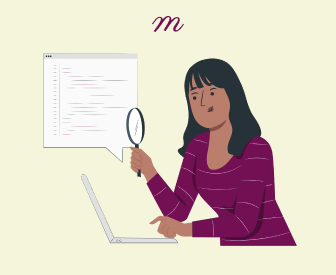Have your progress notes written for you automatically
Self-care for therapists should be essential if you’re a full-time professional. I remember being in graduate school, working full-time, and completing an internship simultaneously. My professors drilled self-care into my head, but no one taught me how to do it, and more importantly, I thought, when will I find the time?
Now after being a therapist for a while, I incorporate strategies into my life that help me distinguish between my personal and professional life. If I don’t care for myself, I can’t show up for my clients and be the best version of myself.
If you don’t care for yourself, you may get burnt out. Therapist Burnout can lead to mental and physical exhaustion. Recovery from burnout can take months or even years. For therapists, it often can lead to a lack of empathy for clients, which is an essential part of the job.
Burnout can often result from chronic job stress. Let’s face it, being a counselor can be very stressful sometimes, so taking care of yourself is essential.
Why is self-care important for mental health professionals?
Self-care not only helps us prevent burnout and compassion fatigue, but it helps us find time to relax and unwind from the profession’s demands. In addition, psychotherapists may experience vicarious traumatization or secondary traumatic stress through their work and need adequate strategies for managing their emotions and stresses.
If you don’t take the time to care for yourself, you may dread client appointments and lose empathy for them. If you’re burnt out, being an effective counselor is challenging.
Self-care activities and tips
Self-care doesn’t look the same for everyone, and that’s okay. You have to find what methods and strategies work for you. Let’s explore some tips for making self-care a little easier.
Protecting your time
If you’re like me, time management tools are a blessing. Not only can time management tools help ease the load, but they can give you more time to focus on the things that matter to you.
Protecting your time is vital for holding healthy work/life boundaries and balancing work and personal time. However, how you hold limits and protect your time may look different depending on what kind of therapy setting you’re in. For example, you may have more freedom with your time if you own a private practice than working in a community agency.
You can use plenty of strategies to manage your time more effectively.
Use a planner or calendar
Using a planner or calendar can not only help you manage client appointments but can help you manage your personal time as well. Be sure to write down any important dates and block off time from work if necessary.
It’s crucial to find a balance between work and home life. If you don’t like working evenings, then you probably aren’t going to want a work setting where you have to work evenings. It’s also important to schedule time off so you have time to recharge and refresh.
Use AI tools for documentation
Many counselor find documentation of therapy sessions challenging. It takes up a lot of time, and many clinicians find it boring and have trouble keeping up.
There are plenty of AI tools out there that can help you write your notes. Mentalyc app can help save you time by writing your notes for you in less than 2 minutes. You just upload a recording of your therapy session with the consent of your clients, and Mentalyc formats and provides you with notes so you can spend less time on documentation.
Prioritize your tasks
Not everything you do is of equal importance. For example, if you’re managing a private practice, you may have to spend time managing your schedule and finding a way to market your business.
Prioritizing and breaking tasks down into manageable pieces can help you feel less overwhelmed with your workload. For example, you may have several client e-mails to respond to daily, which becomes overwhelming. Instead, you could schedule 20-30 minutes daily to respond to client e-mails or prioritize the e-mails by the importance of the correspondence.
If you have several phone calls, maybe you make one call a day until you’re caught up. You may even try body doubling, which is the mere fact of having someone else with you to help you manage tasks like paperwork. Of course, be mindful of confidential client information, but for people that are neurodivergent, this strategy works well.
Find what works for you in managing tasks and prioritizing.
Obtain consultation or talk to other therapists
In a world where many people have switched to providing virtual therapy, isolation can overwhelm many therapists. Therefore, it’s crucial to network and connect with other therapists as other clinicians can be good to bounce ideas off of and can relate to challenges in the field.
Consulting with others to help your clients and provide you with new ideas can be very rewarding. It can also increase your level of connection to other clinicians.
Maintain healthy boundaries
Boundary issues are a big issue for therapists. What a healthy boundary looks like for you may be quite different than what a healthy limit looks like for someone else.
Some common boundary issues that therapists need to think about:
- How many clients you see each week
- Which client problems are within and outside your scope of practice
- What hours you want to work
- How much you charge for therapy
- If you have a cancellation or no-show policies
- Enforcing cancellation or no-show policies
- When you terminate therapy
- When you refer clients out
There aren’t any easy answers for this, and it may look different for each practice. I have a cancellation policy, but I am flexible and often don’t charge clients fees for circumstances outside their control, especially if they communicate with me. Some therapists don’t have cancellation policies, and some enforce them no matter what. In each of these circumstances, the clinician sets healthy boundaries for themselves.
If you’re in an agency, you may not have as much flexibility about your boundaries, as your agency may dictate how many clients you have to see per week or their agency cancellation policy. But you may be able to choose the hours you work. Again, it depends on where you work and what you need for your lifestyle.
Take some time off
Taking some time off can have significant benefits, according to the American Psychological Association (2018). Time off can help you prevent burnout, reduce stress, and increase job satisfaction. Vacations or off time also provide opportunities for psychologists to recharge, relax, and engage in self-care activities, which can improve their mental health and well-being.
Incorporate self-care practices into your daily life
Self-care isn’t a one-time event. It isn’t a single massage or bubble bath. Self-care practices have to be long-term and sustainable in order to be effective. You don’t just take a week’s vacation and call it self-care, though that may be a necessity.
If you’re running on no sleep, eating junk, and never doing anything besides working, you may be headed quickly toward burnout. Finding practices that can work for you each day may be helpful.
Here are some tips for incorporating self-care backed by psychologists:
- Make a habit of moving your body in a way that brings you joy
- Don’t skip meals-make time to eat food that energizes you or tastes good
- Connect with others in your support system
- Maintain a routine or schedule
- Manage your self-talk
- Practice mindfulness techniques
- Develop a gratitude practice
- Find time to immerse yourself in nature
- Refocus on why you are a therapist
Some of these tips were included in a scholarly article on psychologist burnout at the beginning of the COVID-19 pandemic. The authors discussed how managing our inner self-talk about change can affect how we respond to the changes.
When discussing mindfulness, they refer to intentional awareness of the present moment as it is without judging it or trying to change it. When mindful, we focus on the here without letting our thoughts drift to the past or future. As a result, we’re connected to what’s happening in the present.
As you can see from the tips above, these are habits or parts of your daily routine. They aren’t something that you participate in one time and feel better. However, when they become a part of your everyday life, they can help prevent burnout.
Conclusion
Practicing self-care can be challenging if you haven’t done it before. Focusing on one aspect of self-care at a time can help lead you to sustainable practices that prevent burnout. However, it can be overwhelming if you make too many changes simultaneously.
You can look on social media as many therapists, and mental health clinicians form online consult groups to connect with other professionals. You may also use that to find client referrals and training. In addition, online support groups can help you find a variety of information that may be helpful to your practice in the mental health field.
Additionally, engaging in hobbies you love and making them a fun part of your life is essential. If you find that you’re participating in activities you don’t love, that isn’t going to be your best form of self-care. Making time for enjoyable activities is.
Gauging how you spend your time and work boundaries will be essential to assess your current state and help you make changes. For example, spending more time working than you want may signal that you need to work towards setting healthier work boundaries.
If you’re having trouble doing this alone, you might consider finding your own therapist to help you cope. Being a therapist is demanding, and caring for yourself enables you to serve your clients better.
References
- Norcross J, et al. (2020). Psychologist Self-Care During the Pandemic: Now More Than Ever. Retrieved from: https://www.ncbi.nlm.nih.gov/pmc/articles/PMC7195909/
Disclaimer
All examples of mental health documentation are fictional and for informational purposes only.









